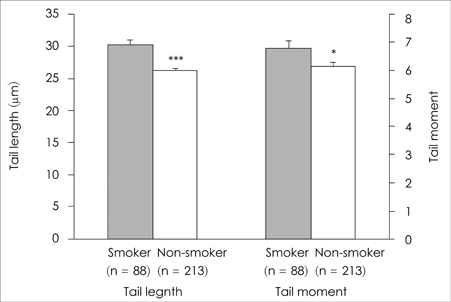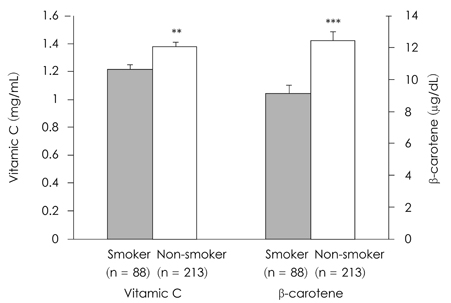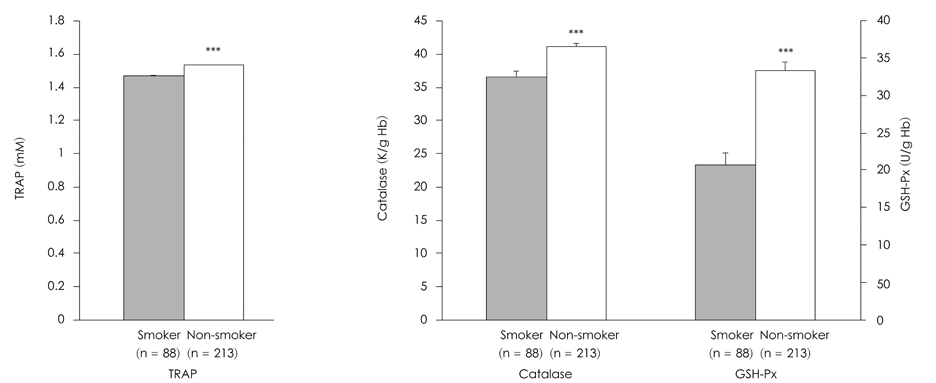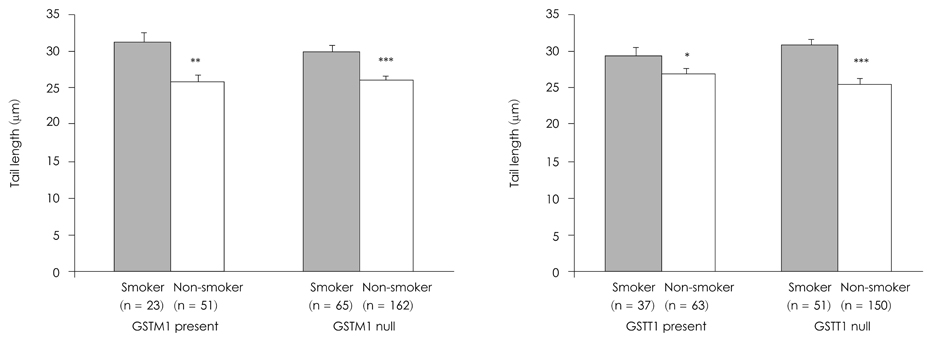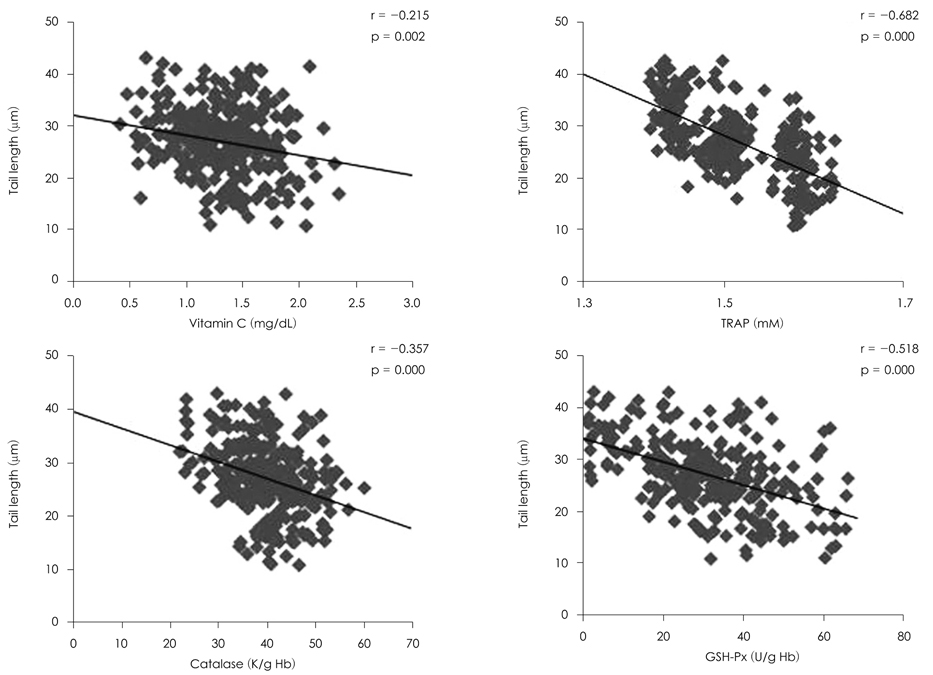Korean J Nutr.
2011 Oct;44(5):366-377. 10.4163/kjn.2011.44.5.366.
Lymphocyte DNA Damage and Anti-Oxidative Parameters are Affected by the Glutathione S-Transferase (GST) M1 and T1 Polymorphism and Smoking Status in Korean Young Adults
- Affiliations
-
- 1Department of Food & Nutrition, Daedeok Valley Campus, Hannam University, Daejeon 305-811, Korea. mhkang@hnu.kr
- KMID: 2268560
- DOI: http://doi.org/10.4163/kjn.2011.44.5.366
Abstract
- Glutathione S-transferase (GST) is a multigene family of phase II detoxifying enzymes that metabolize a wide range of exogenous and endogenous electrophilic compounds. GSTM1 and GSTT1 gene polymorphisms may account for inter-individual variability in coping with oxidative stress. We investigated the relationships between the level of lymphocyte DNA and antioxidative parameters and the effect on GST genotypes. GSTM1 and GSTT1 were characterized in 301 young healthy Korean adults and compared with oxidative stress parameters such as the level of lymphocyte DNA, plasma antioxidant vitamins, and erythrocyte antioxidant enzymes in smokers and non smokers. GST genotype, degree of DNA damage in lymphocytes, erythrocyte activities of superoxide dismutase, catalase, and glutathione peroxidase (GSH-Px), and plasma concentrations of total radical-trapping antioxidant potential (TRAP), vitamin C, alpha- and gamma-tocopherol, alpha- and beta-carotene, and cryptoxanthin were analyzed. Lymphocyte DNA damage assessed by the comet assay was higher in smokers than that in non-smokers, but the levels of plasma vitamin C, beta-carotene, TRAP, erythrocyte catalase, and GSH-Px were lower than those of non-smokers (p < 0.05). Lymphocyte DNA damage was higher in subjects with the GSTM1-null or GSTT1-present genotype than those with the GSTM1-present or GSTT1-null genotype. No difference in erythrocyte antioxidant enzyme activities, plasma TRAP, or vitamin levels was observed in subjects with the GSTM1 or GSTT1 genotypes, except beta-carotene. Significant negative correlations were observed between lymphocyte DNA damage and plasma levels of TRAP and erythrocyte activities of catalase and GSH-Px after adjusting for smoking pack-years. Negative correlations were observed between plasma vitamin C and lymphocyte DNA damage only in individuals with the GSTM1-present or GSTT1-null genotype. The interesting finding was the significant positive correlations between lymphocyte DNA damage and plasma levels of alpha-carotene, beta-carotene, and cryptoxanthin. In conclusion, the GSTM1-null and GSTT1-present genotypes as well as smoking aggravated antioxidant status through lymphocyte DNA damage. This finding confirms that GST polymorphisms could be important determinants of antioxidant status in young smoking and non-smoking adults. Consequently, the protective effect of supplemental antioxidants on DNA damage in individuals carrying the GSTM1-null or GSTT1-present genotypes might show significantly higher values than expected.
MeSH Terms
-
Adult
Antioxidants
Ascorbic Acid
beta Carotene
Carotenoids
Catalase
Comet Assay
DNA
DNA Damage
Erythrocytes
gamma-Tocopherol
Genotype
Glutathione
Glutathione Peroxidase
Glutathione Transferase
Humans
Lifting
Lymphocytes
Multigene Family
Oxidative Stress
Plasma
Smoke
Smoking
Superoxide Dismutase
Vitamins
Xanthophylls
Young Adult
Antioxidants
Ascorbic Acid
Carotenoids
Catalase
DNA
Glutathione
Glutathione Peroxidase
Glutathione Transferase
Smoke
Superoxide Dismutase
Vitamins
Xanthophylls
beta Carotene
gamma-Tocopherol
Figure
Reference
-
1. Begg CB, Mazumdar M. Operating characteristics of a rank correlation test for publication bias. Biometrics. 1994. 50(4):1088–1101.
Article2. Cemeli E, Baumgartner A, Anderson D. Antioxidants and the Comet assay. Mutat Res. 2009. 681(1):51–67.
Article3. Porrini M, Riso P, Brusamolino A, Berti C, Guarnieri S, Visioli F. Daily intake of a formulated tomato drink affects carotenoid plasma and lymphocyte concentrations and improves cellular antioxidant protection. Br J Nutr. 2005. 93(1):93–99.
Article4. Lagadu S, Lechevrel M, Sichel F, Breton J, Pottier D, Couderc R, Moussa F, Prevost V. 8-oxo-7,8-dihydro-2'-deoxyguanosine as a biomarker of oxidative damage in oesophageal cancer patients: lack of association with antioxidant vitamins and polymorphism of hOGG1 and GST. J Exp Clin Cancer Res. 2010. 29:157.
Article5. Pool-Zobel BL, Bub A, Müller H, Wollowski I, Rechkemmer G. Consumption of vegetables reduces genetic damage in humans: first results of a human intervention trial with carotenoid-rich foods. Carcinogenesis. 1997. 18(9):1847–1850.
Article6. Noroozi M, Angerson WJ, Lean ME. Effects of flavonoids and vitamin C on oxidative DNA damage to human lymphocytes. Am J Clin Nutr. 1998. 67(6):1210–1218.
Article7. Park YK, Park E, Kim JS, Kang MH. Daily grape juice consumption reduces oxidative DNA damage and plasma free radical levels in healthy Koreans. Mutat Res. 2003. 529(1-2):77–86.
Article8. Marcon F, Andreoli C, Rossi S, Verdina A, Galati R, Crebelli R. Assessment of individual sensitivity to ionizing radiation and DNA repair efficiency in a healthy population. Mutat Res. 2003. 541(1-2):1–8.
Article9. Sinha R, Caporaso N. Diet, genetic susceptibility and human cancer etiology. J Nutr. 1999. 129:2S Suppl. 556S–559S.
Article10. Hoffmann H, Isner C, Högel J, Speit G. Genetic polymorphisms and the effect of cigarette smoking in the comet assay. Mutagenesis. 2005. 20(5):359–364.
Article11. Strange RC, Fryer AA. The glutathione S-transferases: influence of polymorphism on cancer susceptibility. IARC Sci Publ. 1999. (148):231–249.12. Awasthi YC, Sharma R, Singhal SS. Human glutathione S-transferases. Int J Biochem. 1994. 26(3):295–308.
Article13. Rebbeck TR. Molecular epidemiology of the human glutathione S-transferase genotypes GSTM1 and GSTT1 in cancer susceptibility. Cancer Epidemiol Biomarkers Prev. 1997. 6(9):733–743.14. Nan HM, Kim H, Lim HS, Choi JK, Kawamoto T, Kang JW, Lee CH, Kim YD, Kwon EH. Effects of occupation, lifestyle and genetic polymorphisms of CYP1A1, CYP2E1, GSTM1 and GSTT1 on urinary 1-hydroxypyrene and 2-naphthol concentrations. Carcinogenesis. 2001. 22(5):787–793.
Article15. Ye Z, Song H. Glutathione s-transferase polymorphisms (GSTM1, GSTP1 and GSTT1) and the risk of acute leukaemia: a systematic review and meta-analysis. Eur J Cancer. 2005. 41(7):980–989.
Article16. Davies SM, Bhatia S, Ross JA, Kiffmeyer WR, Gaynon PS, Radloff GA, Robison LL, Perentesis JP. Glutathione S-transferase genotypes, genetic susceptibility, and outcome of therapy in childhood acute lymphoblastic leukemia. Blood. 2002. 100(1):67–71.
Article17. Masetti S, Botto N, Manfredi S, Colombo MG, Rizza A, Vassalle C, Clerico A, Biagini A, Andreassi MG. Interactive effect of the glutathione S-transferase genes and cigarette smoking on occurrence and severity of coronary artery risk. J Mol Med (Berl). 2003. 81(8):488–494.
Article18. Palma S, Cornetta T, Padua L, Cozzi R, Appolloni M, Ievoli E, Testa A. Influence of glutathione S-transferase polymorphisms on genotoxic effects induced by tobacco smoke. Mutat Res. 2007. 633(1):1–12.
Article19. Park E, Kang MH. Smoking and high plasma triglyceride levels as risk factors for oxidative DNA damage in the Korean population. Ann Nutr Metab. 2004. 48(1):36–42.
Article20. Jeon GI, Park E. Effect of glutathione S-transferase polymorphisms on the antioxidant system. J Korean Soc Food Sci Nutr. 2007. 36(6):708–719.
Article21. Jo HR, Lee HJ, Kang MH. Antioxidative status, DNA damage and lipid profiles in Korean young adults by glutathione S-transferase polymorphisms. Korean J Nutr. 2011. 44(1):16–28.
Article22. Pemble S, Schroeder KR, Spencer SR, Meyer DJ, Hallier E, Bolt HM, Ketterer B, Taylor JB. Human glutathione S-transferase theta (GSTT1): cDNA cloning and the characterization of a genetic polymorphism. Biochem J. 1994. 300(Pt 1):271–276.
Article23. Bell DA, Taylor JA, Paulson DF, Robertson CN, Mohler JL, Lucier GW. Genetic risk and carcinogen exposure: a common inherited defect of the carcinogen-metabolism gene glutathione S-transferase M1 (GSTM1) that increases susceptibility to bladder cancer. J Natl Cancer Inst. 1993. 85(14):1159–1164.
Article24. Park EJ, Kim JS, Jeon EJ, Kim HY, Park YK, Kang MH. The effects of purple grape juice supplementation on improvement of antioxidant status and lymphocyte DNA damage in Korean smokers. Korean J Nutr. 2004. 37(4):281–290.25. Kim YD, Eom SY, Zhang YW, Kim H, Park JD, Yu SD, Lee CH, Arashidani K, Kawamoto T, Kim H. Modification of the relationship between urinary 8-OHdG and hippuric acid concentration by GSTM1, GSTT1, and ALDH2 genotypes. Hum Exp Toxicol. 2011. 30(4):338–342.
Article26. McGill HC Jr. The cardiovascular pathology of smoking. Am Heart J. 1988. 115(1 Pt 2):250–257.
Article27. Topinka J, Binková B, Mracková G, Stávková Z, Peterka V, Benes I, Dejmek J, Lenícek J, Pilcík T, Srám RJ. Influence of GSTM1 and NAT2 genotypes on placental DNA adducts in an environmentally exposed population. Environ Mol Mutagen. 1997. 30(2):184–195.
Article28. Bennett WP, Alavanja MC, Blomeke B, Vähäkangas KH, Castrén K, Welsh JA, Bowman ED, Khan MA, Flieder DB, Harris CC. Environmental tobacco smoke, genetic susceptibility and risk of lung cancer in never-smoking women. J Natl Cancer Inst. 1999. 91(23):2009–2014.
Article29. Dusinská M, Ficek A, Horská A, Raslová K, Petrovská H, Vallová B, Drlicková M, Wood SG, Stupáková A, Gasparovic J, Bobek P, Nagyová A, Kováciková Z, Blazícek P, Liegebel U, Collins AR. Glutathione S-transferase polymorphisms influence the level of oxidative DNA damage and antioxidant protection in humans. Mutat Res. 2001. 482(1-2):47–55.
Article30. Reszka E, Wasowicz W, Gromadzinska J. Genetic polymorphism of xenobiotic metabolising enzymes, diet and cancer susceptibility. Br J Nutr. 2006. 96(4):609–619.31. Palli D, Masala G, Vineis P, Garte S, Saieva C, Krogh V, Panico S, Tumino R, Munnia A, Riboli E, Peluso M. Biomarkers of dietary intake of micronutrients modulate DNA adduct levels in healthy adults. Carcinogenesis. 2003. 24(4):739–746.
Article32. Wang Y, Ichiba M, Oishi H, Iyadomi M, Shono N, Tomokuni K. Relationship between plasma concentrations of beta-carotene and alpha-tocopherol and life-style factors and levels of DNA adducts in lymphocytes. Nutr Cancer. 1997. 27(1):69–73.
Article33. Wang Y, Ichiba M, Iyadomi M, Zhang J, Tomokuni K. Effects of genetic polymorphism of metabolic enzymes, nutrition, and lifestyle factors on DNA adduct formation in lymphocytes. Ind Health. 1998. 36(4):337–346.
Article34. Brennan P, Hsu CC, Moullan N, Szeszenia-Dabrowska N, Lissowska J, Zaridze D, Rudnai P, Fabianova E, Mates D, Bencko V, Foretova L, Janout V, Gemignani F, Chabrier A, Hall J, Hung RJ, Boffetta P, Canzian F. Effect of cruciferous vegetables on lung cancer in patients stratified by genetic status: a mendelian randomisation approach. Lancet. 2005. 366(9496):1558–1560.
Article
- Full Text Links
- Actions
-
Cited
- CITED
-
- Close
- Share
- Similar articles
-
- Antioxidative Status, DNA Damage and Lipid Profiles in Korean Young Adults by Glutathione S-Transferase Polymorphisms
- Effects of lymphocyte DNA damage levels in Korean plant food groups and Korean diet regarding to glutathione S-transferase M1 and T1 polymorphisms
- Lack of Association between Glutathione S-Transferase-M1, -T1, and -P1 Polymorphisms and Olanzapine-Induced Weight Gain in Korean Schizophrenic Patients
- Association between Antipsychotic-Induced Restless Legs Syndrome and Glutathione S-Transferase Gst-M1, Gst-T1 and Gst-P1 Gene Polymorphisms
- Glutathion S-Transferase M1 Gene Polymorphism is Associated with Type 2 Diabetic Nephropathy

